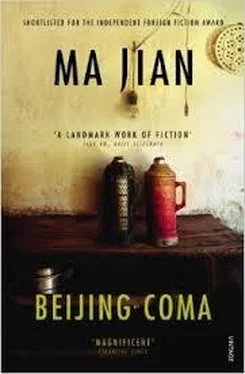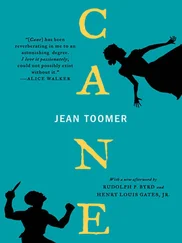‘There’ve been so many coups and reshuffles recently, I don’t even know who the Federation’s chairman is now,’ Nuwa said, emerging from behind the blackboard that separated the broadcasting area from the rest of the room. Her new short bob made her neck look longer and paler.
‘All those coups happened before the 4 May march,’ Shu Tong said. ‘Old Fu had the gall to convene a meeting while I was having a nap in the printing room, and got me voted off the Federation. If I hadn’t founded the Dialogue Delegation I’d be out of a job now.’ The previous week, tens of thousands of us had marched to the Square again to mark the seventieth anniversary of the May Fourth Movement. Fired by the same patriotism as the students in 1919, we demanded democratic reforms and direct talks with the government.
‘I thought Old Fu resigned from the Federation,’ Bai Ling said, then winced as she took a sip of boiling tea.
‘Really?’ Nuwa said. ‘I saw him in the Triangle this morning. He was asking students to sign a petition calling on the university authorities to award Gorbachev an honorary degree during his forthcoming visit to Beijing. He asked me to help him find a translator. He wants to discuss the matter with the Soviet ambassador!’ Nuwa laughed, covering her mouth with her hand to hide the pieces of fried dough stick she was chewing. Her gestures were always graceful. As I watched her dig her big toes into the insoles of her red leather sandals, I breathed in, but couldn’t smell the sweat on her feet.
‘I expect Old Fu handed in his resignation in the middle of the night,’ Yang Tao said, coming in to look for something to eat. ‘When he gets tired, he does rash things which he totally forgets about the next morning.’
‘Old Fu’s done his week as chairman, so it was time for him to resign anyway,’ I said, handing Yang Tao a steamed roll, which he devoured greedily. Han Dan and Liu Gang were muttering behind the blackboard. They’d just taken part in a broadcast discussion of Gorbachev’s perestroika reforms, and it sounded as if they were having an argument. The room was incredibly noisy. We couldn’t shut the windows properly because of the many electric cables hanging out. I decided that the next day I’d block off the broadcasting area with hardboard to diminish the din.
Han Dan suddenly raised his voice. They’d forgotten to turn off the microphone, so I rushed over and switched it off.
‘Stop going on about the ’87 protests,’ he yelled at Liu Gang, so loudly that everyone in the corridor could hear. ‘This movement is on a different scale. We’ve had petitions, sit-ins, marches, class boycotts, demands for dialogue…’
‘That’s the problem: we’ve been doing too much,’ said Liu Gang. ‘We should stop the marches and refocus on building up democracy within the campus.’ Liu Gang had been chairman of the Organising Committee since the 4 May march, and Han Dan was now his deputy.
‘If you’re going to have a row, leave the broadcasting area,’ Shu Tong said sternly. ‘The cables are in a terrible mess. Can someone sort them out?’
‘But we’ve reached an impasse,’ complained Han Dan as he and Liu Gang walked over to the bunk beds. ‘The class boycott hasn’t achieved anything. The best option now would be to go ahead with a hunger strike. It would win us popular support and force the government’s hand.’
A hubbub broke out. ‘I suppose that means you’ll want to get everyone out onto the streets again,’ Shu Tong moaned.
‘The Federation and the Organising Committee are both opposed to a strike,’ Hai Feng said, ‘and so is the Dialogue Delegation. We can’t hope to negotiate with the government while at the same time exerting pressure through a hunger strike. They wouldn’t listen to us.’
‘Well, they haven’t shown much sign of wanting to listen to us so far,’ said Han Dan, rolling up his sleeves. ‘If we don’t use a more radical approach, they’ll ignore us completely, and our movement will disintegrate.’
‘Our efforts at securing a dialogue are progressing well,’ Shu Tong said, his face turning red with anger. ‘If we launch a hunger strike, our relationship with the government will break down. And besides, most of the students here don’t support the idea. That graduate student in Block 46 who’s gone on hunger strike is a crank.’
‘Hunger strikes can be a very effective form of political protest,’ Bai Ling said, coming to Han Dan’s defence. ‘They’ve achieved a lot of success in other countries.’
Han Dan slammed his fist on the table and said, ‘The reformers in the Party have sent us messages telling us to step up our protests. They said, “the bigger the better!”’
A little nervously, Tian Yi stood up and said, ‘We’ve received many notes supporting a hunger strike. You’re not in tune with the mood of the campus, Shu Tong. The students are much more radical than you.’
‘Yes!’ exclaimed Nuwa. ‘You’ve spent so much time locked up in meetings here, you’ve lost touch with what’s going on outside.’
‘Gorbachev will be arriving in Beijing on the 15th,’ continued Han Dan. ‘It’ll be the first time a Soviet leader has visited China in forty years. The government will want to hold a big welcoming ceremony for him in Tiananmen Square. If we stage a hunger strike in the Square while he’s in town it will force the government to compromise.’
‘Well, if you want to go ahead with this crackpot plan, you’ll have to do it alone and resign from the Federation and the Organising Committee,’ Shu Tong said. He knew that the strike would destroy his Dialogue Delegation.
‘All you lot do is talk, talk, talk,’ Han Dan said, ‘but what we need is action.’ I’d never heard him speak so forcefully before. ‘All right, I will hand in my resignation. Switch the microphone back on, Dai Wei. I want to make a public announcement.’
‘You can’t let the students know how disunited we are,’ Tian Yi said.
‘Don’t worry, I know what to say,’ Han Dan said, stubbornly heading back to the microphone.
‘We’re relaying the Beijing Radio news at the moment,’ I said. ‘Do you want to interrupt it? Old Fu will be presenting his Democracy Forum show soon. Why not make your announcement then?’
Han Dan agreed, and went off to the canteen with Yang Tao.
Bai Ling and Tian Yi said they’d be willing to go on hunger strike. I laughed and said they’d give up after a day.
Wang Fei and I went outside to play ping-pong near the Triangle. On our way there, we bumped into my mother. Many parents had been coming onto the campus to ask the professors whether their children had joined the protests. My mother had just visited the university’s Party committee office and told them that she’d begged me to withdraw from the movement, but that I’d refused to listen, and that she would support any action the government chose to take.
In the middle of the wastes, where the River Sweet peters out, lies a mountain that is home to three kingdoms. The inhabitants of these kingdoms have feathers on their bodies and hatch from eggs.
My mother asks a passenger to help lift me off the train, then we wait on the platform for my cousin Dai Dongsheng to turn up. He arrives in a hired tractor and drives us back to his home in Dezhou, thirty kilometres away. It is the Dai ancestral village where my father was born. I have never visited it before. Although there are very few members of the Dai clan still living there, I still have a sense that I’m returning to my roots.
On the bumpy journey there, I think about Wang Fei’s letter. It arrived a few days ago, and my mother read it out to me on the train. Wang Fei described how, after he was discharged from hospital, he was interrogated by the police for several months and told never to disclose to anyone that he’d seen army tanks crushing the students. When he refused to agree to this, he was told he wouldn’t be allocated a job after graduation. ‘I’m confined to a wheelchair,’ he wrote. ‘But I haven’t given up on life. I recently took part in the third national games for the disabled… A friend’s sister helped me find a job in Hainan Island… You and I got the roughest deal in the end, Dai Wei. We’re worse off even than poor Mou Sen. What a bloody mess this world is…’
Читать дальше












